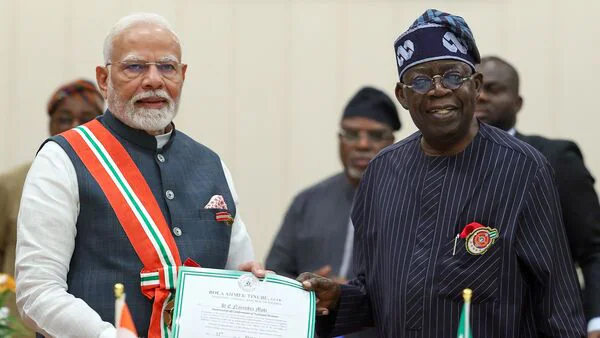India's strategic engagement in Africa, especially in West Africa, has gained significant momentum. A notable development in this context is the visit of Prime Minister Narendra Modi to Nigeria in 2024, marking the first visit by an Indian Prime Minister to Nigeria in 17 years. This visit is part of India's broader diplomatic agenda aimed at deepening ties with key African nations, particularly Nigeria. As the largest economy and democracy in Africa, Nigeria holds a crucial position in India’s foreign policy.
India’s Strategic Objectives in West Africa
1. Strengthening Bilateral Relations with Nigeria
Nigeria, as the largest economy and democracy in Africa, plays a central role in regional and continental affairs. Strengthening ties with Nigeria is essential for India’s influence in Africa. Through this partnership, India seeks to enhance its role on the continent, influence regional dynamics, and secure long-term diplomatic ties.
2. Focus on Security Cooperation
Nigeria faces significant security challenges such as terrorism, piracy, drug trafficking, and insurgency, particularly from Boko Haram. India, with its vast experience in counterterrorism, seeks to bolster security cooperation with Nigeria. This collaboration includes the supply of Indian-made weapons, technical support, and joint counterterrorism operations. India's involvement aims to enhance Nigeria’s security capabilities and contribute to regional stability.
3. Development Partnerships
India aims to position itself as a key development partner for Nigeria by offering concessional loans, capacity-building programs, and technical assistance in areas like infrastructure, education, and healthcare. India’s development model emphasizes people-centered growth, contrasting with more top-down models employed by other international actors. By assisting Nigeria, India seeks to deepen socio-economic ties.
4. Promoting Global South Aspirations
India and Nigeria, as leaders of the Global South, seek to amplify the voices of developing nations in global institutions like the United Nations and the World Trade Organization. Strengthening bilateral relations allows India and Nigeria to work together in international forums to advocate for the interests of the Global South.
Key Areas of Cooperation Between India and Nigeria
1. Economic and Trade Relations
India and Nigeria have had strong trade relations in the past, but recent years have seen a decline in trade, from $14.95 billion in 2021-22 to $7.89 billion in 2023-24. This decline is primarily due to fluctuating global oil prices and India’s increased oil imports from Russia. Despite this, both countries continue exploring ways to revitalize trade relations, focusing on sectors like energy, agriculture, and technology.
o Economic Cooperation Agreements: India is negotiating agreements like the Economic Cooperation Agreement (ECA) and the Bilateral Investment Treaty (BIT) to promote investment and facilitate trade.
o Defence and Security Cooperation: India has become a significant defence partner for Nigeria, providing weapons, training, and technical expertise. India’s experience in counterterrorism is valuable for Nigeria in combating groups like Boko Haram.
2. Infrastructure Development
India has been involved in several infrastructure projects in Nigeria, offering concessional loans and technical assistance. These projects focus on key sectors like energy, roads, power plants, and educational institutions. India’s involvement in these areas aims to support Nigeria’s growth while also enhancing bilateral ties.
3. People-to-People Exchanges
India’s focus on enhancing cultural and educational ties with Nigeria includes offering scholarships, training programs, and technical assistance. These initiatives aim to build goodwill and mutual understanding between the peoples of both nations, fostering long-term cooperation.
4. Health and Education Cooperation
India’s assistance in the health sector includes training programs for Nigerian professionals in medicine and technology. Additionally, India’s affordable medicines have been vital in addressing Nigeria’s health challenges. The collaboration in education focuses on skill-building and capacity development, further strengthening bilateral ties.

Nigeria’s Economic Ties with China
1. China’s Role in Nigeria’s Infrastructure
China has funded major infrastructural projects in Nigeria, including the Lekki Deep Sea Port, expected to ease cargo congestion and stimulate economic growth by creating thousands of jobs. Chinese companies are also involved in building essential infrastructure such as railways, roads, and airports across the country. These investments are part of China’s broader Belt and Road Initiative (BRI).
2. Technology and Telecommunications
China’s technology companies, particularly Huawei, have a significant presence in Nigeria. Huawei has trained thousands of Nigerian youths and government employees in areas like cybersecurity. Additionally, Huawei has deployed mobile towers and fiber optic cables, further embedding China’s influence in Nigeria’s telecommunications sector.
3. Challenges of Competition
India faces increasing competition from China, particularly in Nigeria’s infrastructure and technology sectors. China’s deep financial involvement presents challenges to India’s efforts to secure a larger share of these markets. However, India’s expertise in defence and human resource development remains a key area where it has a competitive edge.
Challenges and Opportunities for India in Nigeria
1. Geopolitical Competition
China’s growing footprint in Nigeria presents a major challenge. With Chinese companies dominating sectors like infrastructure and telecommunications, India must find ways to leverage its strengths in defence, human resource development, and technology to maintain its relevance in Nigeria.
2. Economic Vulnerabilities
The decline in trade between India and Nigeria highlights the economic vulnerabilities in their relationship. Changes in global oil markets and shifting import patterns have affected trade volumes. India’s focus on diversifying its trade and investment in sectors like energy and technology is crucial to sustaining its relationship with Nigeria.
3. Political Instability
Nigeria’s political landscape remains unpredictable, which poses risks for long-term cooperation. Political instability could disrupt bilateral initiatives and deter investments. India must adopt a flexible approach, focusing on short-term initiatives while maintaining its long-term objectives in Nigeria.
4. Capacity Constraints
Despite India’s developmental assistance, the local capacity to implement projects in Nigeria is often limited. India’s approach needs to be tailored to address these constraints and ensure that developmental initiatives are effectively carried out.
Way Forward
- Prime Minister Modi’s visit to Nigeria was a significant step in strengthening India-Nigeria relations. However, more sustained efforts are required to convert goodwill into tangible outcomes. India’s strategic objectives in Nigeria and West Africa focus on enhancing security cooperation, expanding trade, and supporting socio-economic development. While competition from China is an obstacle, India’s long-standing relationship with Nigeria, particularly in defence and development, offers ample opportunities for further growth.
- To enhance cooperation, India must focus on diversifying trade, deepening security partnerships, and expanding capacity-building initiatives in key sectors such as healthcare, education, and infrastructure. India can also explore further collaboration in emerging sectors like renewable energy and digital technology. By doing so, India can maintain its position as a key partner to Nigeria and other West African nations, ensuring a balanced, multipolar global order that reflects the aspirations of the Global South.
|
Probable Questions for UPSC Mains Exam: Despite strong bilateral ties, India faces several challenges in strengthening its relations with Nigeria. Critically examine these challenges and suggest strategic measures that India could adopt to overcome them. |








